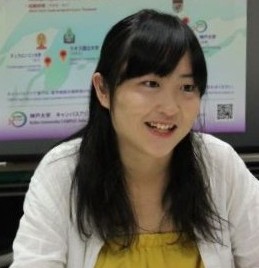Participants' Voices
Next Stage
Double Degree
Kobe University to Korea University
GSICS
Ms. UCHIYAMA Kaori

Profile: Doctoral student at the GSICS, Kobe University; after completing her studies at the Department of International Politics and Economics at Aoyama Gakuin University in 2019, she worked at Mizuho Bank, Niigata Branch, before entering Kobe University Graduate School in 2021.
Q1: What was your original experience/trigger that made you interested in international cooperation?
When I was in junior high school, I saw the movie, Hotel Rwanda. In addition to the gruesome content of the movie, I was shocked to learn that this happened around the time of my birth. After watching the movie, I realized that even today, this world is still not at peace, and I wanted to work on international issues to prevent such sad things from happening. During my undergraduate years, I majored in International Politics. I thought International politics could be a means of deterring conflict. In addition to International Politics, my original experience led me to study international economics and global governance.
Q2: How did you end up enrolling in the GSICS at Kobe University?
I have wanted to work for international corporations since I was a junior high school student, but I was financially unable to do so when I graduated from undergraduate school. In addition, when I looked at the profiles of people active in international organizations, I got the impression that many had experience working for major banks. Consequently, I got a job to help pay for school and gain work experience for the future. Then, after working at the bank for a little less than two years, when I had saved enough money to pay for my tuition, I took the entrance exam for GSICS, which is famous for its international cooperation, and was admitted.
Q3: How did you hear about the CAMPUS Asia Program and why did you participate?
I learned about the program from the Kobe University website before I took the entrance exam; however, as I was interested in Africa, I thought I would not participate in the program before I enrolled. However, I heard the summarized version of the program at the graduate school’s entrance ceremony and was attracted by the wonderful opportunity to earn a master’s degree at the renowned Korea University and the temporal and financial efficiency of earning two master’s degrees in two years while attending Kobe University and decided to participate.
Q4: How did you prepare for the CAMPUS Asia selection process?
I put a lot of effort into preparing for the interview, especially by contacting CAMPUS Asia alumni and seniors who were currently participating in the program, asking them about the professors and classes at Korea University and requesting them to teach me how to prepare for the interview. The seniors not only talked to me but also kindly supported me by giving me interview practice.
In addition, I took Ogawa-Sensei’s classes and actively spoke up in class so that he would remember my face when I went in for the interview.
In preparing for the selection process, I gave special thought to my reasoning as to why I would participate in the CAMPUS Asia Program for my research in Africa. Ultimately, my goal is to develop my research and analytical skills in CAMPUS Asia.
Q5: How did you prepare for your departure for CAMPUS Asia?
I had heard that all Korea University’s classes are offered in English and that there are many lively discussions; thus, I knew that I needed to improve my English-speaking skills, especially before my departure. Therefore, I increased my opportunities to speak English by taking English classes at Kobe University, actively speaking up, and making many international student friends. Furthermore, anticipating the need to write a master’s thesis at Kobe University after completing my CA, I prepared my research plan by relating the content of my thesis at Korea University to that at Kobe University.
